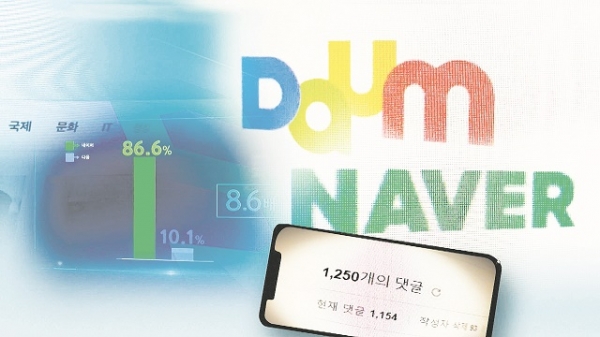
The Reuters Institute for the Study of Journalism announced in 2021 that 72% of Koreans read online news from portals, a web-based platform that collects information from different sources. This figure was the greatest among the 46 countries that participated and more than double the average of 33%. The biggest problem with reading news from portal sites is that the articles are ranked by the number of page views (pv). Professor Young-Gi Joo of Hallym university media school stated that "When portals arrange articles in the number of pvs, understanding the context of the current society becomes arduous for readers."
One thing that creates more concern is the state of news articles on the portal sites. According to Maeil Business newspaper, 85% of Koreans use Naver as the portal for news. Journalists Association of Korea (JAK) researched articles from Naver last year and found that most articles with the highest pv contained sexual content while their titles tend to amplify it. In November 2021, a Korean Youtuber uploaded a lookbook video where she was dressed in her underwear and changed into different clothes, including a costume that resembled K- Air’s stewardess uniform. This video quickly made the rounds on the Internet, and K- Air decided to take legal action. Articles about this video and K- Air's response flooded online portals the next day and one look at the titles portrays what the media tends to magnify: "Woman in underwear, states that she did not edit her video while wearing a stewardess costume", "stewardess look book", "Youtuber accused". Although current society views gender issues as important, using the aforementioned expressions seems largely unnecessary. Overall, 235 articles were uploaded to Naver two months after the first report. Each press uploaded multiple articles about the issue with few updates as if they were responding to the situation; a common method they use to produce more articles.
Other articles that ranked high in pv were about celebrities. The press uses expressions like [specialized], [breaking], [comprehensive] in their titles on articles about celebrities most often. JAK expressed their concern about the excessive use of such expressions on text written only for clicks and interest without deep investigation. JAK reported that 40% of the main articles in Naver written by 14 most influential presses were based on articles from another press or social news sites without further verification.
Professor Chang-Suk Kim of Ehwa Women’s university stated, "The press should reconsider their role. Are they writing articles for the people or to earn money? This method of writing articles may help them earn more profit in short term, but readers will slowly lose faith, and the demolition of the press is inevitable." Although the press and journalists are greatly responsible for this phenomenon, it is not entirely their fault. Only 13% of the respondents from Reuter’s investigation stated that they subscribe to online news and Korea ranked the lowest in the percentage of readers visiting the official website of the press to read the news. Respondents claim that after news started to appear in portals, people began to view it as something that should be easily accessible and free to read. Many do not understand why they should pay money and wait for the news to arrive. Therefore, journalists write articles with sexual content and exaggerate it in their titles as gaining pv is now their main source of income. Writing short and aggravating articles allow them to gain more profit, while writing good articles requires research and time. Thus, it is simply a less efficient way to earn money when compared to short articles.
Although tabloid journalism has existed in multiple countries for a long time, tabloid journalism has become a major issue in countries where people rely on portals as their central news source. Japan ranked second in the research by Reuters at 69%, and they also suffer from the same problem. The first and fundamental way to solve this problem is to reduce our dependence on portals as our news source. Even though they are convenient, reading the news from a portal promotes the production of tabloid articles. Readers should participate in creating a better environment for future journalism.


